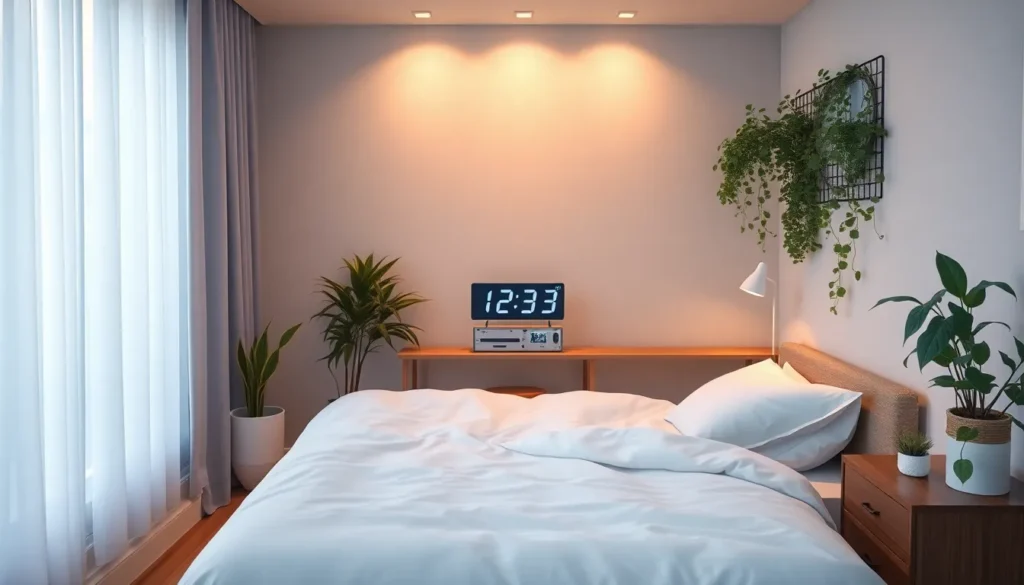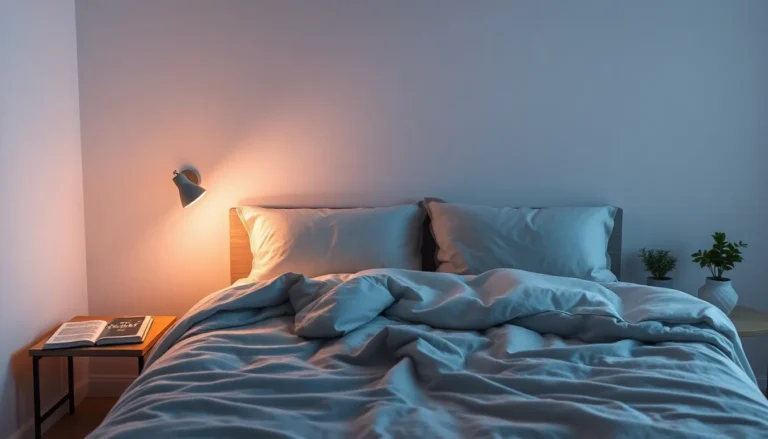Table of Contents
ToggleIn a world that never sleeps, getting a good night’s rest can feel like chasing a unicorn. Yet, quality sleep isn’t just a luxury; it’s a necessity for a healthy, happy life. Imagine waking up feeling refreshed instead of resembling a zombie who just stumbled out of a horror movie. Sounds dreamy, right?
Importance Of Protecting Sleep Quality
Protecting sleep quality significantly influences overall well-being. Prioritizing good sleep leads to a healthier lifestyle, making it essential to understand its benefits.
Benefits For Physical Health
Good sleep enhances the immune system, reducing the likelihood of illnesses. It contributes to weight management by balancing hormones that regulate appetite. Cardiovascular health also improves, as restful nights decrease blood pressure and inflammation. Research shows that individuals who sleep well have better metabolic function. Consistent sleep patterns foster recovery and muscle repair, crucial for active individuals. These benefits together create a solid foundation for physical resilience and vitality.
Benefits For Mental Wellbeing
Improved sleep quality contributes to better cognitive function and focus. It fosters emotional stability, minimizing the risk of anxiety and depression. Memory consolidation occurs during restful sleep, enhancing learning and retention of information. Sleep also increases creativity, allowing for more effective problem-solving. Regular, quality sleep promotes an overall positive mood, enabling individuals to navigate daily challenges with ease. These mental well-being benefits emphasize the need for prioritizing sleep quality in daily routines.
Common Threats To Sleep Quality

Various factors threaten sleep quality. Identifying these threats helps in taking steps to protect sleep.
Environmental Factors
Noise pollution disrupts sleep cycles. Light exposure, particularly from screens, affects melatonin production. Temperatures that are too hot or cold can hinder the ability to fall asleep. Dust and allergens can lead to respiratory issues, which in turn interrupt sleep. Controlling these environmental factors creates a more conducive atmosphere for restful sleep.
Lifestyle Choices
Irregular sleep schedules contribute to poor sleep quality. Excessive caffeine intake, especially in the afternoon, can lead to insomnia. Alcohol consumption before bed may seem to help initially, yet it disrupts sleep patterns later. Sedentary lifestyles decrease the ability to achieve restorative sleep. Prioritizing healthier lifestyle habits significantly improves overall sleep quality.
Strategies To Protect Sleep Quality
Improving sleep quality requires intentional strategies that adapt to individual needs. Focusing on the following methods enhances the overall sleep experience.
Creating A Sleep-Friendly Environment
A dark, quiet, and cool bedroom increases the chances of restful nights. Consider using blackout curtains to block light from outside. Incorporate white noise machines or soft music to mask disturbing sounds. Maintaining a temperature between 60 and 67 degrees Fahrenheit supports comfort. Additionally, investing in a quality mattress and pillows promotes better alignment and comfort.
Establishing A Consistent Sleep Schedule
Consistency plays a crucial role in regulating sleep patterns. Going to bed and waking up at the same time daily helps set the body’s internal clock. Limiting naps during the day prevents interference with nighttime sleep. Gradually adjusting the schedule by 15 minutes can ease transitions. Ultimately, this practice fosters a routine that encourages deeper and more restorative slumber.
Utilizing Relaxation Techniques
Incorporating relaxation techniques before bedtime can significantly improve sleep quality. Engaging in meditation or deep breathing exercises lowers stress levels and prepares the mind for rest. Reading a book or taking a warm bath creates a calming pre-sleep ritual. Gentle yoga stretches also reduce muscle tension, promoting tranquility. These practices, when carried out regularly, can enhance the overall sleep experience.
Technology’s Role In Sleep Quality
Technology significantly influences sleep quality by providing tools for monitoring and improving sleep habits. Various advancements promote healthier sleep patterns and enhance overall well-being.
Sleep Tracking Devices
Sleep tracking devices offer insights into sleep patterns and behaviors. These wearables, such as smartwatches or fitness trackers, monitor metrics like sleep duration, stages, and disturbances. Users gain clarity on their sleep quality and can identify trends that impact rest. With this information, individuals can make informed changes to their nightly routines. For example, data indicating frequent awakenings may prompt adjustments in sleep environment or lifestyle choices. Overall, tracking devices empower individuals to take charge of their sleep health.
Apps For Better Sleep Habits
Numerous apps exist to assist with developing better sleep habits. Many of these applications feature guided meditation, soothing sounds, and bedtime reminders. Users can engage in relaxation techniques that promote sleep readiness. Besides offering insights into sleep patterns, some apps suggest personalized recommendations based on user behavior. By implementing strategies from these apps, individuals foster a consistent sleep schedule and reduce nighttime anxiety. Overall, leveraging technology in this way enhances the quality of sleep and cultivates healthier sleep practices.
Protecting sleep quality is vital for overall health and well-being. By addressing environmental factors and lifestyle choices that threaten restful sleep, individuals can create a sanctuary for rejuvenation. Implementing intentional strategies like maintaining a consistent sleep schedule and utilizing relaxation techniques can lead to deeper slumber.
Incorporating technology, such as sleep tracking devices and dedicated apps, further enhances one’s ability to monitor and improve sleep habits. Prioritizing these practices not only boosts physical health but also nurtures mental clarity and emotional stability. Ultimately, investing in sleep quality pays dividends in daily life, fostering a happier and healthier existence.







